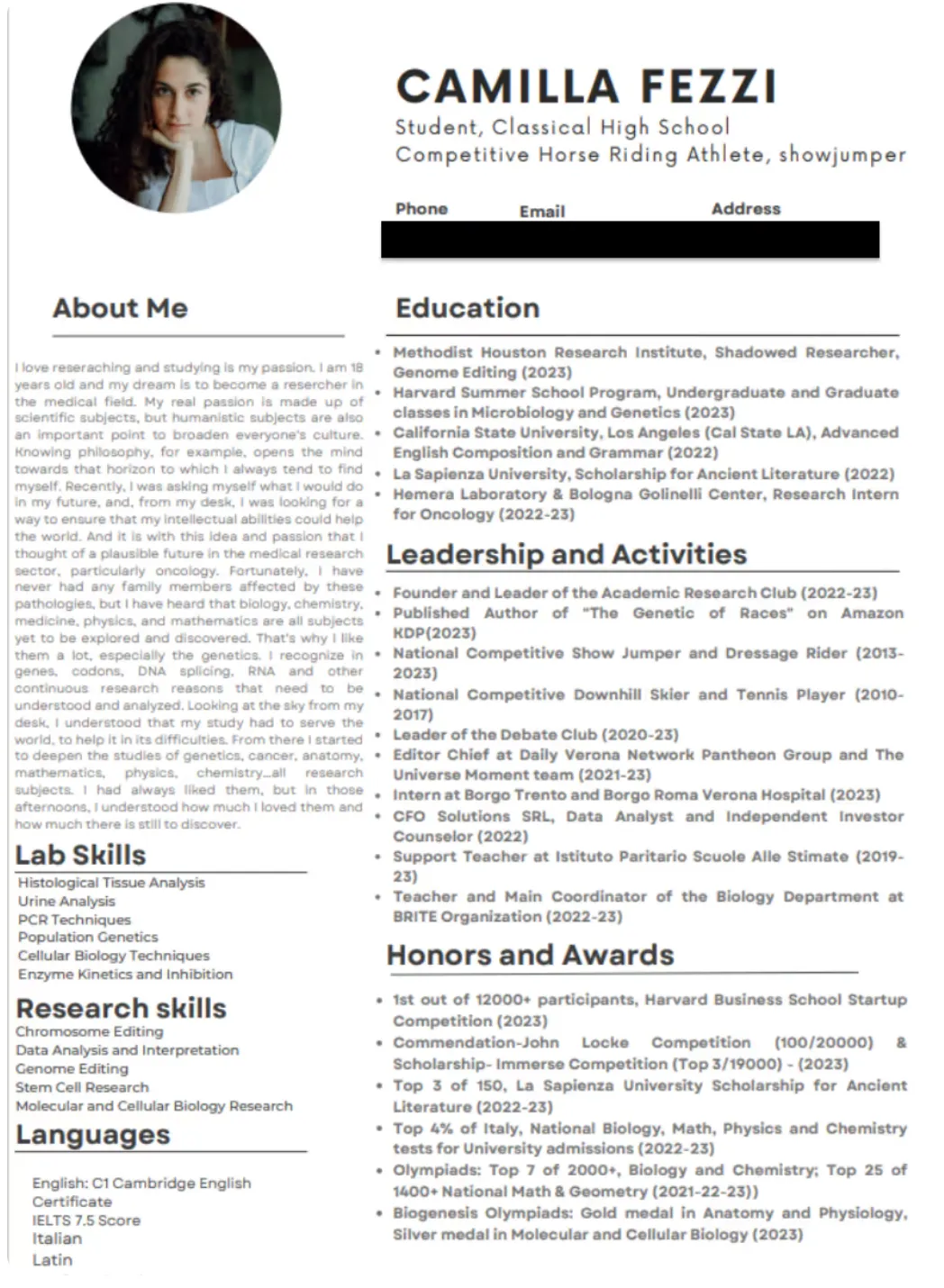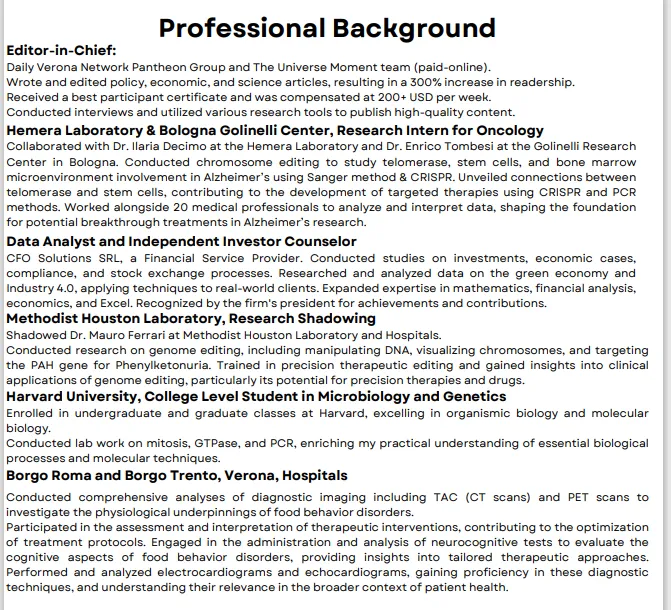Resume on Common App: Should You Upload, How To (Guide and Examples)


The college application process requires the student to complete numerous tasks, from supplemental essays to activities and honors lists and more. However, one common question students ask is whether they should include a resume as part of their Common App profile, and if so, how to do so effectively. We will explore the reasons why you might want to include a resume and offer advice for seamlessly integrating it into your application. By following this guide, you can boost your chances of standing out to admissions officers and showcasing your achievements confidently.
On the Common App, you will have space to write about your achievements in both the activities and honors sections. However, because students often have more experiences and accomplishments than the Common App allows them to include in their activities and honors sections, many universities provide space to upload a full resume. So, should you include your resume in your college application? The general rule of thumb is this: if your resume includes important information that is not already highlighted in your activities and honors sections, your supplemental essays, or your additional information section, only then should you include it. It is not advised to submit a resume if the document simply repeats information admissions officers can access elsewhere in your application. So, resumes can help to:
Supplement Your Application: A resume can ensure that admissions officers see important information you may not have been able to fit elsewhere in your application.y
Highlight Special Projects: For students who have completed complex research, high-level art projects, or other impactful work, a resume can offer space to elaborate on these experiences.
Expand on the Details of Professional and Academic Experiences: Many applicants have completed work experiences, internships, or competitive summer programs at which they demonstrated professional skills and command of advanced material far beyond what is expected of typical high school students. A resume can ensure that colleges understand the specifics of the impressive work these students completed as part of these experiences.

A well crafted resume can give you a strategic advantage by offering a fully fleshed-out narrative of your academic and professional experiencesA resume lets you compile and present all your accomplishments in one cohesive document, with room to elaborate on the roles you played in your achievements. This detailed approach gives the admission officer a fuller picture of your capabilities and the scope of your involvement across various undertakings.
This resume should outline how your skills and level of responsibility in your endeavors have increased over time. It should also reveal how early lower-level experiences led to more advanced opportunities and roles later on, demonstrating a growth trajectory throughout high school. This reflects a commitment to excellence that admissions officers value. A resume can also provide an opportunity to directly communicate with the admission committee. It allows you to emphasize the aspects of your profile that best match the values and academic strengths of the college to which you're applying.
A strong resume will also help to establish your application narrative by highlighting experiences that are relevant to your intended course of study and provide evidence of how you’ll contribute to the campus community at the school. You can do justice to the sophistication and depth of your projects in a way that you may not be able to in the little space offered in the Common App.
Finally, remember that admissions officers have to review thousands and thousands of applications. An effective resume should convey, in one swift glance, the most significant aspects of your profile, and it should leave admissions officers knowing clearly what makes you unique.


A Header with Contact Information
Start with a clear header featuring your name, address, phone number, email, and any relevant professional social media links or websites.
Your Educational Background
List your high school information–including your GPA, class rank (if applicable), and anticipated graduation date–and include your standardized test scores and any relevant advanced coursework.
A Detailed Experiences Section
Include paid work, internships, volunteer opportunities, summer programs, research projects, business or non-profit ventures, and extracurricular activities. Make sure to highlight your specific contributions when describing each experience.
Prioritize Clarity and Conciseness
Use bullet points to describe your roles and achievements in a clear and concise manner.
Tailor Content
Customize your resume to align with the values and characteristics of each college to which you are applying.
Quantify Achievements. Wherever possible, add numbers to quantify your impact. If you organized a charity event that raised over $10,000, make sure to include that specific amount of money in your description.
Activities and Honors Section: List here any academic, artistic, or community awards that emphasize your competitiveness.
Skills Section: Include any languages you speak in addition to your primary one, as well as technical skills and other competencies related to your intended area of study. For example, if you’re interested in computer science, it’s a good idea to include any coding languages you’re comfortable with in your skills section.
Personal Projects: Elaborate on any independent projects you’ve completed to a high level.
Before uploading, ensure your resume is polished and tailored for college applications. It should be clear, concise, and formatted professionally with no typos or mistakes. Here are a few helpful tips:
Use a Professional Format: Opt for a clean, readable layout. Standard fonts like Arial, Times New Roman, or Calibri are recommended.
Keep it Relevant: Include experiences and achievements that are recent and relevant to your academic and career goals, and present them, as much as possible, in chronological order.
Proofread Again: Check again to make sure there are no typos or grammatical errors. Have someone else review it as well to catch any mistakes you might have missed. Typos and mistakes signal to colleges that you haven’t taken your application seriously.
To maintain the formatting and ensure that your document looks the same on any device, save your resume as a PDF file. This is a widely accepted format that reduces the risk of formatting errors when viewed on different platforms.
Verify Acceptance: Not all colleges on the Common App require or accept a resume. Check each college’s application requirements through their admissions page or the Common App college information section to confirm if they accept additional documents like resumes.
Follow Specific Instructions: Some colleges may have specific guidelines about the types of supplementary materials they accept and how these should be formatted or labeled.
Access Your Account: Log into your Common App account.
Navigate to the Dashboard: Go to the ‘My Colleges’ section, where you’ll manage individual applications for each college.
Depending on the college’s requirements, you may upload your resume in one of two places:
Additional Information Section and Supplemental Materials: Some colleges allow you to upload a resume under the ‘Additional Information’ or ‘Supplemental Materials’ sections of the application.
Portfolio or Writing Supplement: For programs that require portfolios or have a writing supplement, you might be able to include your resume there.
Properly Label Your File: When uploading, ensure your resume file is properly named (e.g., FirstName_LastName_Resume.pdf) to make it easy for admissions officers to identify.
Confirm Upload: Make sure the file has uploaded correctly by previewing it if possible.
Check that all sections are properly filled out and that your resume is attached. Double-check to see that the attachment has loaded properly and is formatted just as you wanted.
Attaching a resume to your Common App can ensure that colleges see the full picture of what makes you a unique and impressive applicant. Just make sure that your resume adds additional information not included elsewhere on your application before you submit it.
For any student hoping to build a high-impact college application resume that will impress college admissions officers, research can offer a significant boost. Our Indigo Research program offers guidance to students in completing such projects. As admissions become more competitive by the year, being able to list an interesting research project on your application reflects your initiative, intellectual curiosity, and love for pursuing academic excellence. Indigo Research can provide the perfect opportunity for this kind of student-led independent research experience.





If you want to build a high-impact college application resume that will impress college admissions officers, or even future employers, join our research program! Translation of personal interests into published, peer-reviewed research serves as a testament to the student's capability to run and bring complex projects to completion, exemplifying skills that go much further than a normal classroom experience would be expected to allow.
.png)
If you want to build a high-impact college application resume that will impress college admissions officers, or even future employers, join our research program! Translation of personal interests into published, peer-reviewed research serves as a testament to the student's capability to run and bring complex projects to completion, exemplifying skills that go much further than a normal classroom experience would be expected to allow.